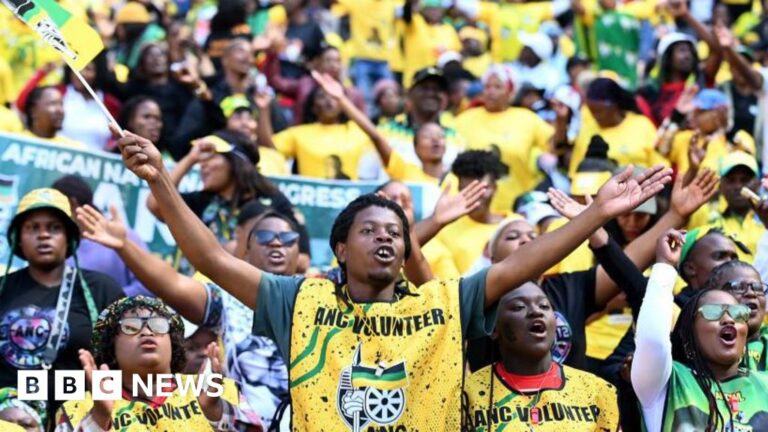Just hours before the first meeting of South Africa’s Parliament since the ruling African National Congress (ANC) lost its majority in last month’s elections, negotiations continue on the formation of a new government.
The ANC claims to have made a “breakthrough” in forming a national unity government, but it is too early to give details.
A spokesperson for the main opposition Democratic Alliance party, Solly Malatsi, told the BBC that the “main aspects” of a framework agreement had been concluded but “we are not there yet”.
One of Parliament’s first tasks should be a secret vote on whether Cyril Ramaphosa will remain president.
Although a coalition agreement has not yet been finalized, Mr Ramaphosa is expected to be re-elected.
The ANC lost its parliamentary majority for the first time in 30 years in the May 29 elections, receiving 40% of the vote.
This means that support from other parties was needed for Mr Ramaphosa to remain in power.
“We are currently talking with political parties,” ANC secretary-general Fikile Mbalula told reporters after a meeting of senior party officials on Thursday evening, adding that he could not give further details.
He said it would be a move toward the political center, as the ANC’s splinter parties on the left have said they will not join a coalition.
He said parties, including the pro-business DA, had agreed to form a national unity government.
But the ANC and DA have not agreed on exactly how they will cooperate, Mr Mbalula added.
“If the DA got some of the things they want, it would mean the ANC would be dead,” he said.
The DA came second in the election with 22% of the vote.
DA spokesperson Mr Malatsi told the BBC’s Newsday programme: “There were still some very important outstanding issues which should have been finalized by the end of yesterday (Thursday) “That wasn’t the case because of the nature of the negotiations we had.” I’m in.”
The Zulu nationalist Inkatha Freedom Party (IFP) has already announced its participation in a national unity government. He comes fifth with 4% of the votes.
President Ramaphosa has previously accused the DA – which draws its support mainly from racial minorities – of being “traitorous” and “reactionary”.
Any deal with the DA would be unpopular among many ANC activists.
The party is a proponent of a free market economy, which is at odds with the ANC’s left-wing traditions, and is seen by its critics as representing the interests of the white minority.
The ANC presented the coalition as a Government of National Unity (GNU), but it failed to win over the third and fourth largest parties – former president Jacob Zuma’s uMkhonto weSizwe (MK) party and Julius Malema’s Economic Freedom Fighters (EFF) – to join him.
MK had set Mr Ramaphosa’s resignation as one of the conditions for entering a coalition, but the ANC rejected the demand.
Mr Malema said on Thursday night that the EFF had refused to join a government that included the DA, saying it was part of the “imperialist agenda”.
MK and EFF also demanded changes to the constitution to allow nationalization, including of white-owned land and banks.
Mr Ramaphosa opposed this, saying the ANC would not form a coalition with parties seeking to amend the constitution.


